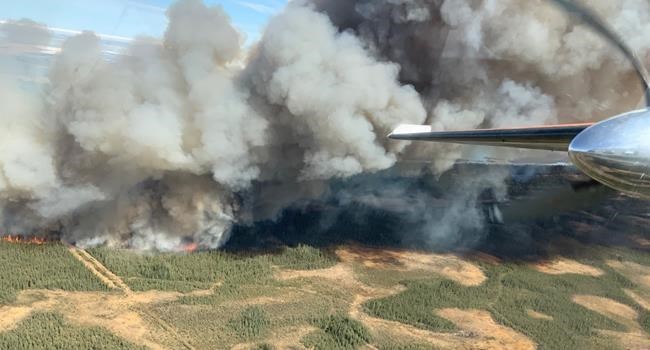Officials urged caution ahead of the long weekend as thousands of residents in Western Canada and the Northwest Territories remained out of their homes due to wildfires.
"Don't be responsible for starting a new wildfire," Christie Tucker of Alberta Wildfire said Thursday.
She said there were 92 active wildfires in the province, with 26 of them classified as out of control.
Two weeks after evacuation orders started being issued in the province, about 10,000 evacuees are still out of their homes.
More than 2,600 people are helping to fight Alberta's fires, including crews from across Canada, the United States and the Armed Forces. Tucker said another 113 firefighters from the U.S. and 18 from Yukon were joining Thursday.
Todd Loewen, Alberta's Minister of Forestry, Parks and Tourism, urged people in the northwestern region near fires to voluntarily restrict recreational activities on Crown land, including backcountry camping, mountain biking and hiking.
He said some provincial parks, recreation areas and campgrounds have also been closed because of the high fire danger.
"I know that for many of us the weekend is traditionally spent outdoors with family and friends," said Loewen. "I know this is disappointing for many, but it is necessary to reduce the risk of wildfire."
In the N.W.T., about 3,500 people evacuated Sunday from K'atl'odeeche First Nation and the neighbouring community of Hay River, N.W.T.
Officials said 896 had registered to stay in Yellowknife.
"Help isn't going anywhere," Shane Thompson, territorial minister of environment and climate change, told a media briefing Thursday.
"We will be with you every step of the way."
The fire, which was last estimated at nearly 18 square kilometers, is suspected to have been human-caused. Officials said there have been no reports of damage in Hay River, but 15 buildings have been damaged on the reserve.
N.W.T. wildfire information officer Mike Westwick said extremely hot and dry conditions on Wednesday led to greater fire activity, with heavy smoke and ash being pushed toward the communities.
He said 11 fire crews — nearly 120 people — and multiple helicopters, air tankers and pieces of heavy equipment were working to battle the fire and prevent further damage.
"We're looking ahead to some difficult days of working on this fire," he said, adding the outlook for the wildfire season across the territory is severe.
The Saskatchewan Public Safety Agency said there were 24 active wildfires in the northern part of the province as of Thursday morning. Some of the fires have spanned larger than 1,000 square kilometres and most are believed to human-caused.
The agency said it’s supporting nearly 1,075 people in Saskatchewan, providing them with food and accommodations in Lloydminster, North Battleford and Regina.
Bryan Chartrand, the agency’s director of land operations, said it could be a week before evacuees can return home.
“I don’t have a magic number, but it won’t be any time in the near future,” he said.
“We’re looking at at least a week plus ... unless we get a large rain event that is not forecasted right now.”
Crews are to assess some areas where it’s believed cabins have burned, he added. But there were no reports of other structural losses.
Premier Scott Moe said the government is looking to provide vouchers to people in non-evacuated communities, including La Loche and Clearwater River Dene Nation, where people have been without power for almost three days and food in their freezers may have expired.
The main highway into those communities is closed and only essential travel is allowed. But trucks carrying food and fuel were being allowed north of the fire line.
“We’re in active discussions and we hope to come to a decision quickly on how we can get our grocery and fuel trucks into those communities north of the fire line,” Moe said.
In British Columbia, the City of Fort St. John lifted an evacuation alert Wednesday that had put the community of about 21,000 residents on edge.
But more than 1,300 properties in the surrounding area remained under an evacuation order.
This report by The Canadian Press was first published May 18, 2023.
___
-- With files from Ritika Dubey in Edmonton
This story was produced with the financial assistance of the Meta and Canadian Press News Fellowship.
Emily Blake and Jeremy Simes, The Canadian Press




